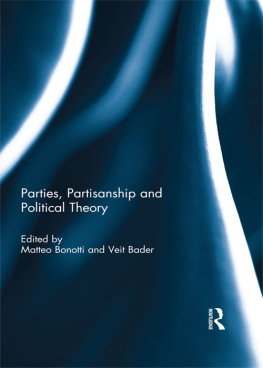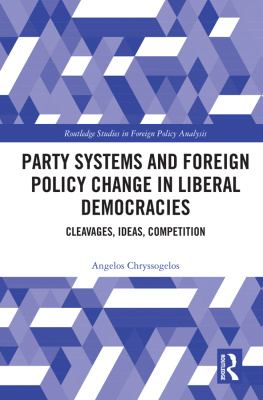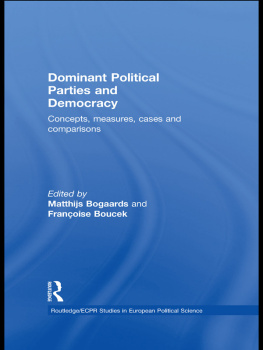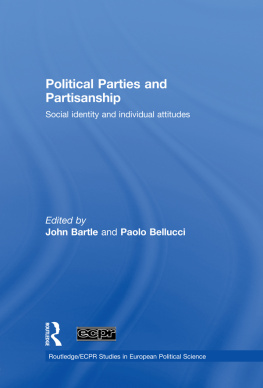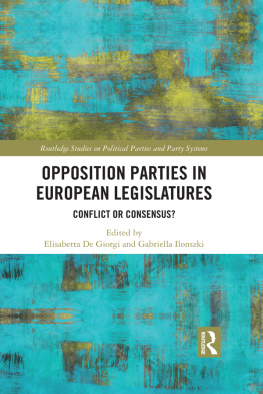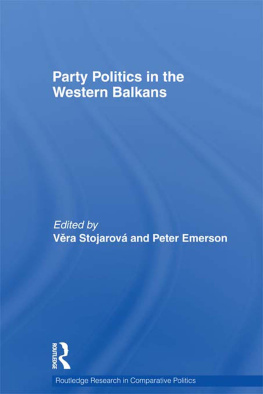Parties, Partisanship and Political Theory
Political parties have only recently become a subject of investigation in normative political theory. Parties have traditionally been studied by political scientists in their organizational features and in relation to the analysis of related topics such as party systems and electoral systems. Little attention, however, was paid until recently to the normative assumptions that underlie partisanship and party politics. Are parties desirable for democratic politics? How should liberal democracies deal with extremist and/or anti-democratic parties? Do religious parties undermine the secular distinction between religion and politics and is that bad for liberal democracies? These are only some of the many questions that political theorists had left unanswered for a long time.
The chapters in this collection aim to provide a twofold contribution to the normative analysis of partisanship. On the one hand, they aim to offer a first much needed state of the art of the existing research in this area. Many of the contributors have already done extensive research on partisanship and their chapters partly reflect their research expertise and individual approaches to this topic. On the other hand, all chapters move beyond the authors existing work and represent significant additions to the normative literature on partisanship, thus setting the standards for future research in this area.
This book was originally published as a special issue of the Critical Review of International Social and Political Philosophy.
Matteo Bonotti is a Lecturer in Political Theory (fixed term) at Queens University Belfast, UK. His research interests lie in contemporary political theory, with a special focus on the normative dimensions of partisanship, religion and political theory, and John Rawlss political liberalism. He is also interested in the normative aspects of food policy and language policy. His publications include articles in the European Journal of Political Theory, Res Publica, Ethical Perspectives and Politics.
Veit Bader is Emeritus Professor of Sociology (Department of Political and Socio-cultural Sciences) and of Social and Political Philosophy (Department of Philosophy) at the University of Amsterdam, The Netherlands, and a member of IMES (Institute of Migration and Ethnic Studies). He has written on a wide range of issues in critical social theory; social inequalities and collective action; democracy and the rule of law (particularly in the EU); racism, ethnicity and citizenship; ethics of migration and incorporation of minorities; global justice; governance of religious diversity. His most recent book is: Secularism or Democracy? Associational Governance of Religious Diversity (2007).
Parties, Partisanship and Political Theory
Edited by
Matteo Bonotti and Veit Bader
First published 2015
by Routledge
2 Park Square, Milton Park, Abingdon, Oxon, OX14 4RN, UK
and by Routledge
711 Third Avenue, New York, NY 10017, USA
Routledge is an imprint of the Taylor & Francis Group, an informa business
2015 Taylor & Francis
All rights reserved. No part of this book may be reprinted or reproduced or utilised in any form or by any electronic, mechanical, or other means, now known or hereafter invented, including photocopying and recording, or in any information storage or retrieval system, without permission in writing from the publishers.
Trademark notice: Product or corporate names may be trademarks or registered trademarks, and are used only for identification and explanation without intent to infringe.
British Library Cataloguing in Publication Data
A catalogue record for this book is available from the British Library
ISBN 13: 978-1-138-79384-2
ePub eISBN 13: 978-1-317-64320-3
Mobipocket/Kindle eISBN 13: 978-1-317-64319-7
Typeset in Times New Roman
by RefineCatch Limited, Bungay, Suffolk
Publishers Note
The publisher accepts responsibility for any inconsistencies that may have arisen during the conversion of this book from journal articles to book chapters, namely the possible inclusion of journal terminology.
Disclaimer
Every effort has been made to contact copyright holders for their permission to reprint material in this book. The publishers would be grateful to hear from any copyright holder who is not here acknowledged and will undertake to rectify any errors or omissions in future editions of this book.
Contents
Veit Bader and Matteo Bonotti
Nancy L. Rosenblum
Bryan T. McGraw
Matteo Bonotti
Graeme Orr
Veit Bader
Jonathan White
The chapters in this book were originally published in the Critical Review of International Social and Political Philosophy, volume 17, issue 13 (March 2014). When citing this material, please use the original page numbering for each article, as follows:
Chapter 1
Introduction: Parties, partisanship and political theory
Veit Bader and Matteo Bonotti
Critical Review of International Social and Political Philosophy, volume 17, issue 13 (March 2014) pp. 253266
Chapter 2
Partisanship and independence: the peculiar moralism of American politics
Nancy L. Rosenblum
Critical Review of International Social and Political Philosophy, volume 17, issue 13 (March 2014) pp. 267288
Chapter 3
Religious parties and the problem of democratic political legitimacy
Bryan T. McGraw
Critical Review of International Social and Political Philosophy, volume 17, issue 13 (March 2014) pp. 289313
Chapter 4
Partisanship and public reason
Matteo Bonotti
Critical Review of International Social and Political Philosophy, volume 17, issue 13 (March 2014) pp. 314331
Chapter 5
Private association and public brand: the dualistic conception of political parties in the common law world
Graeme Orr
Critical Review of International Social and Political Philosophy, volume 17, issue 13 (March 2014) pp. 332349
Chapter 6
Crisis of political parties and representative democracies: rethinking parties in associational, experimentalist governance
Veit Bader
Critical Review of International Social and Political Philosophy, volume 17, issue 13 (March 2014) pp. 350376
Chapter 7
Transnational partisanship: idea and practice
Jonathan White
Critical Review of International Social and Political Philosophy, volume 17, issue 13 (March 2014) pp. 377400
Please direct any queries you may have about the citations to
clsuk.permissions@cengage.com
Veit Badera and Matteo Bonottib
aDepartments of Philosophy and Sociology, University of Amsterdam, The Netherlands; bSchool of Politics, International Studies and Philosophy, Queens University Belfast, Belfast, UK
As E. E. Schattschneider once remarked, political parties are the orphans of political philosophy (Schattschneider 1942, p. 10). It is surprising that despite the growing number of scholars dealing with the normative dimensions of partisanship, some of whom have contributed to this volume, parties still remain somehow at the margins of contemporary political philosophy. Is this a problem? And why should political philosophers and theorists care about parties? This special issue aims to provide some preliminary answers to this question.

